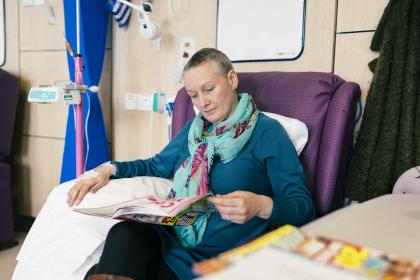The National Institute of Health and Care Excellence (NICE) has been reviewing access to the ovarian cancer drug niraparib (Zejula®) from second line of treatment (for people with a recurrence). The committee met to decide whether it should be routinely available (routine commissioning) once it's taken off the Cancer Drugs Fund later this year.
The initial decision is to make niraparib available from second line of treatment only to people with a BRCA1 or BRCA2 mutation. This is a change from the previous recommendation where it was available to everyone with advanced ovarian cancer from second line of treatment.
Provisional decision
Having innovative treatments available routinely on the NHS is crucial for everyone with a diagnosis of ovarian cancer. We played an active role on the NICE committee, advocating for access to continue, and we're extremely disappointed to hear this initial recommendation.
At this stage it’s a provisional decision – it’s not set in stone. We hope that NHS England (which funds cancer treatments) and the manufacturer will explore all avenues to find a solution. We’re calling on them to make sure ovarian cancer drugs like niraparib are available to everyone who can benefit from them.
Annwen Jones OBE, Chief Executive of Target Ovarian Cancer, said:
Although today’s announcement is only an initial recommendation, it’s not a good sign that access to this life-extending drug for recurrent ovarian cancer could now be restricted to those with a BRCA mutation. Innovative treatments like niraparib should continue to be available to all who can benefit. We strongly urge NICE and the manufacturer, as a matter of urgency, to find a solution that works for everyone.
There will be a further committee meeting to consider this decision in October and we have an opportunity to submit further comments for the committee to consider. We need your help – if you do not have a BRCA mutation and have taken niraparib from the second line of treatment onwards, please email [email protected] to tell us about your experiences. All responses must be received by Thursday 9 September.
Who will this affect?
Until this decision is made final, nothing changes. This decision will not affect anyone taking niraparib at the moment or in the near future. You can continue to take it until you or your clinician feel it’s appropriate to stop.
There are other cancer drugs available to women who would like to access a similar maintenance treatment (PARP inhibitor) from the second line of treatment. Niraparib is also available from the very beginning (first line) of ovarian cancer treatment – this is a separate NICE guideline. Learn more about what cancer drugs may be available to you.
This is a decision made by NICE in England. Wales and Northern Ireland usually follow decisions made by NICE. It’s already available in Scotland and this decision will not affect anyone who lives there.
Our work on access to cancer drugs
We work hard to champion better access to innovative cancer drugs. We played an active role in the National Institute for Health and Care Excellence (NICE) and SMC appraisal process by submitting evidence and acting as the patient expert at NICE and SMC committee meetings. If you'd like to find out more about our campaigns for improved treatment, join our campaigns network.




